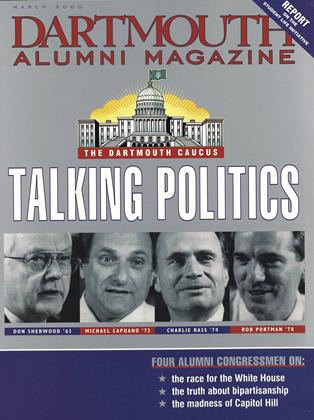Paris, schmaris. Dartmouth students have always had their own sense of style.
1778
On the frontier, fashion is the first thing to go. "My family & School are in want of Cloathing...we have cut up all the sheets and table cloths which could be spared in the House, to cover their nakedness, and have now scarce a whole linen garment in the house," Dr. Wheelock writes.
1860
Formal frock coats, vests and top hats make a fashion statement during the Civil War era.
1882
Top hats are replaced with bowlers. Watch chains and walking sticks complete the new look.
1889
The brothers of Delta Kappa Epsilon assemble for their group portrait in cricket clothing imported from Britain. Historians say the style reflects the period's emphasis on the educational value of sport.
1915
Plastered down hair is really cool. Students achieve the wet look without mousse by soaking their hair, then wrapping their head in linen until dry.
1925
The Prince of Wales starts a trend by wearing his college letter sweater. The look jumps the Atlantic and makes its way to Hanover, where it becomes de rigueur for the well-dressed Dartmouth man.
1937
Fashion-conscious students look snappy in padded sports coats and flamboyant socks.
1953
Ivy League sportiness combines with 1950s neatness to produce the cleanest of clean cuts: guys in great sweaters and their dates in white blouses and dark shirts.
1974
The enrollment of women doesn't change the Dartmouth look. Both sexes are comfortable with shoulder-length locks, jeans and heavy boots.
1995
Although pierced tongues are the rage, less adventurous men demonstrate their fashion awareness by donning baseball caps and flannel shirts.
1999
The Dartmouth reports that North Face clothing is key to a trendy wardrobe.
According to a Playboy fashion spread, these Dartmouth ladsrepresented the apex of collegiate style in 1967.
 View Full Issue
View Full Issue
More From This Issue
-
 Cover Story
Cover StoryThe Dartmouth Caucus
March 2000 By Jake Tapper ’91 -
 Feature
FeatureThe Day F. Scott Fitzgerald Came to Campus
March 2000 By MAURY RAPF ’35 -
 Feature
FeatureOne on One
March 2000 By Mel Allen -
 Interview
InterviewPicture Perfect
March 2000 By CHRISTOPHER KELLY ’96 -
 CURMUDGEON
CURMUDGEONSkating on Thin Ice
March 2000 By Noel Perrin -
 Interview
Interview“Now We Have a Platform for Discussion”
March 2000
Article
-
 Article
ArticleTHE FIRST DARTMOUTH OUTING CLUB
January, 1931 -
 Article
ArticleAlumni Council Meets
March 1949 -
 Article
ArticleFaculty Publications
May 1951 -
 Article
ArticleDARTMOUTH IN THE CIVIL WAR
April, 1909 By A. E. Blunt '69 -
 Article
ArticleIdeals of Work-Service in Vermont
May 1941 By CRAIG KUHN '42 -
 Article
ArticleHouse Party Fever
JUNE 1932 By J. S. Monagan '33

